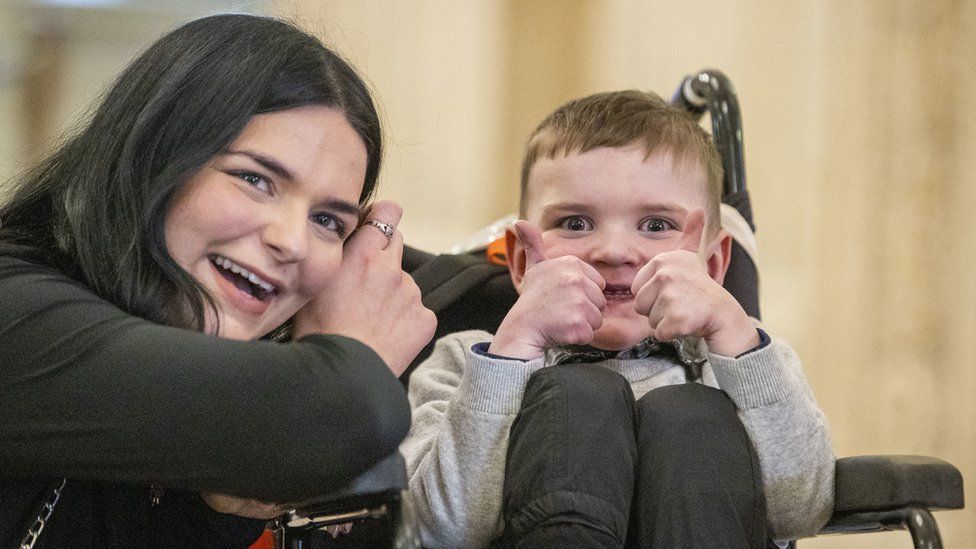文章管理 查看文章



A law ushering in a new opt-out organ donation system in Northern Ireland is facing a continual delay.
Dáithí's Law, as the legislation is known, will mean people automatically become potential donors unless they explicitly say they wish not to be.
The legislation was passed in February 2022 and was due to become law in spring 2023 but has been held up by the Stormont stalemate.
Northern Ireland is the only part of the UK where an opt-out system is not yet in place.
So what is the background to the law and why is it taking so long to be introduced?
Who is Dáithí?
Dáithí MacGabhann was born in 2016 with hypoplastic left heart syndrome, meaning the left side of the heart did not form correctly.
The six-year-old has been on the list to get a heart transplant for about five years, with his family campaigning for a change in organ donation laws since 2018.
Assembly members at Stormont decided to name the Organ and Tissue Donation (Deemed Consent) Bill after him in February 2022, in recognition of his family's campaigning efforts.
How did Dáithí's Law come to Northern Ireland?
An opt-out organ donation system was debated in the Northern Ireland Assembly as far back as 2012 when then Ulster Unionist assembly member Jo-Anne Dobson introduced a private member's bill on organ donation.
While that failed after being rejected by Stormont's Health Committee in 2016, the conversation picked up again two years later when Dáithí MacGabhann's family began campaigning for a soft opt-out law.
The new bill was supported by all of Stormont's parties except the Democratic Unionist Party (DUP), with some DUP members saying they preferred an opt-in organ donation system.
However, in June 2021 the DUP's Paul Givan, who was first minister at that time, announced he had given approval for the legislation to go ahead to the assembly so it could potentially pass into law.
At the time then Health Minister Robin Swann said about 180 lives could be changed each year by overhauling the rules.
The law passed its final stage in the assembly in February 2022 but secondary legislation is needed to specify which organs and tissues are covered under the opt-out system.
Without it the system cannot come into effect.
What is holding it back?
In the same month the law passed through its final stage in the assembly a seismic shift occurred in Northern Ireland politics - Paul Givan resigned as first minister as part of the DUP's protest against the Northern Ireland Protocol.
After the Stormont election in May 2022 the DUP continued its boycott by blocking the election of a Speaker in the assembly, which prevented the formation of a power-sharing government in Northern Ireland.
Without a Speaker legislation cannot be passed - including the secondary legislation necessary to enact Dáithí's Law.
Image source, Getty Images
The DUP has argued that the legislation on organ donation in Northern Ireland can be dealt with at Westminster.
However Northern Ireland Secretary Chris Heaton-Harris has said that would be a "long and arduous process" while the assembly could have if a speaker is elected.
On 14 February after the DUP refused to back a nomination for Speaker.
What system is in place in Northern Ireland?
Organ donation only proceeds in Northern Ireland if a person has given their express consent, usually by signing on to the NHS Organ Donor Register or by speaking to their family.
In the absence of that the family is asked to decide on behalf of the patient.
Dáithí's Law would mean all adults in Northern Ireland would be considered potential organ donors after their death, unless they have specifically stated otherwise.
Statistics published by the Public Health Agency in 2022 showed that 90% of people in Northern Ireland support organ donation but only half of people have signed the Organ Donor Register.
It also stated that about 10 to 15 people die each year while waiting on a transplant.
What about the rest of the UK and the Republic of Ireland?
In December 2015 Wales became the first nation in the UK to introduce the soft opt-out organ donation scheme.
One year later the Welsh health secretary said the number of donations under the new law was "encouraging" but it was too early to tell how effective the bill was going to be.
England brought in a similar law in May 2020, with 296 donations under the law in the first year, accounting for 29% of all donors (1,021) in that period.
Opt-out organ donation came into affect in Scotland in March 2021, slightly later than planned due to the Covid-19 pandemic.
The Human Tissue Bill was introduced in the Republic of Ireland in November 2022.
It is currently moving through the Oireachtas (Irish parliament).
Related Topics